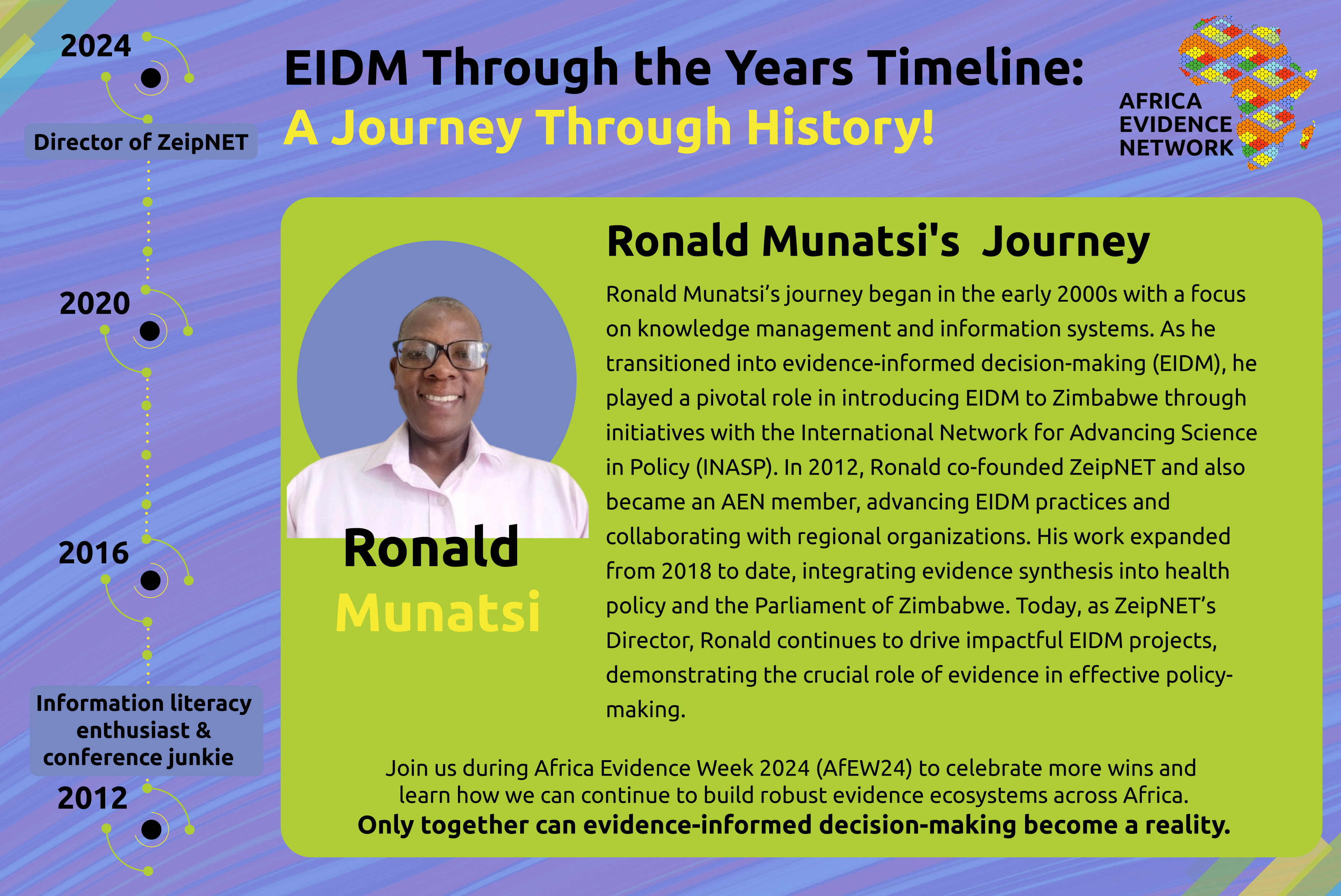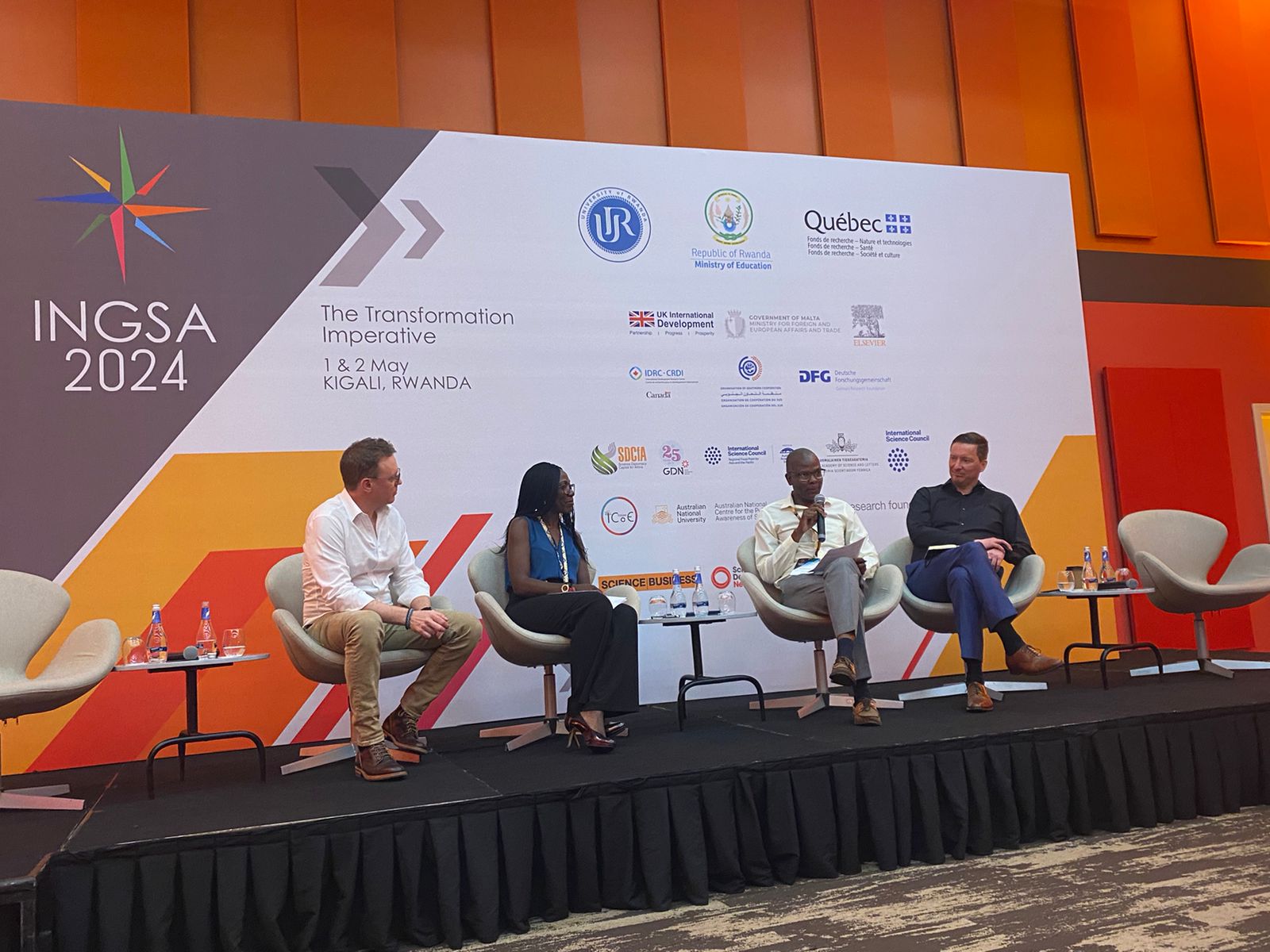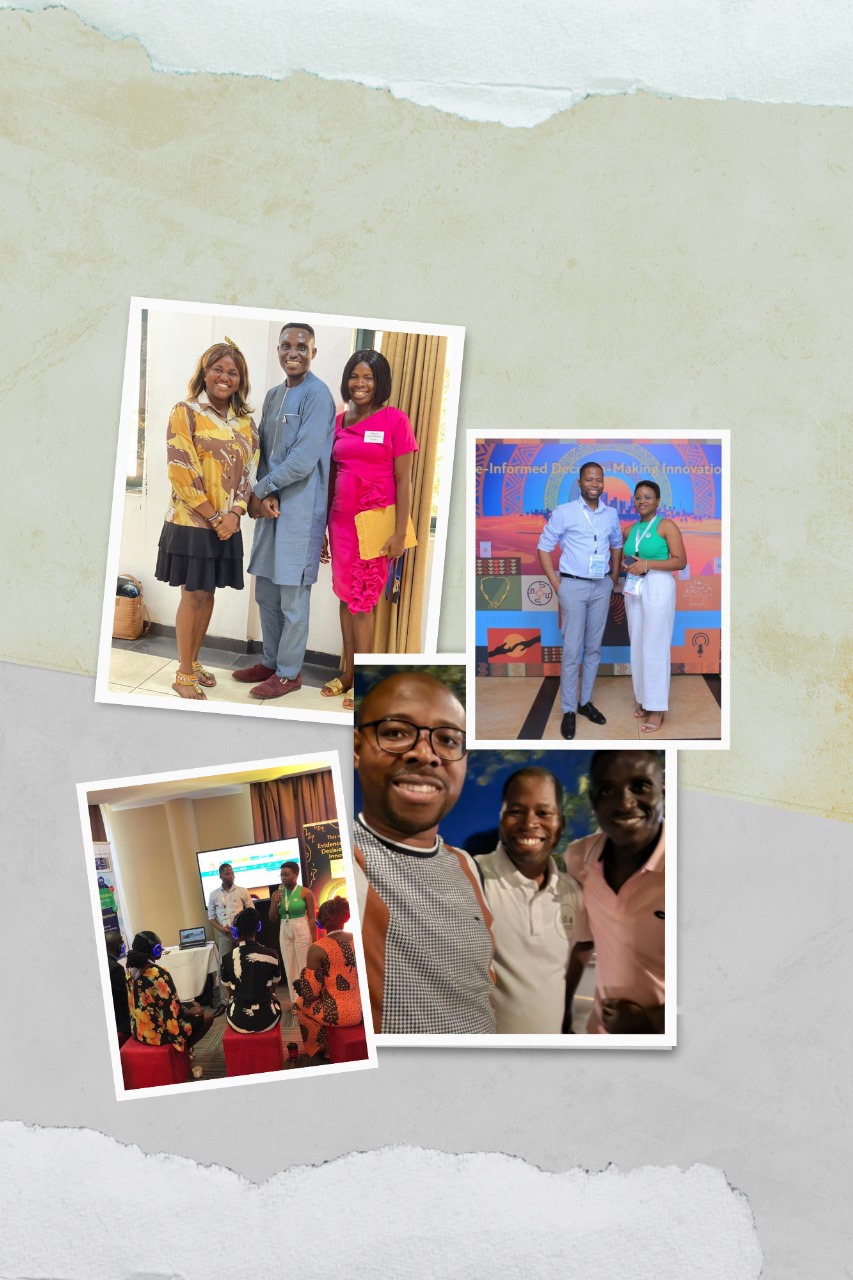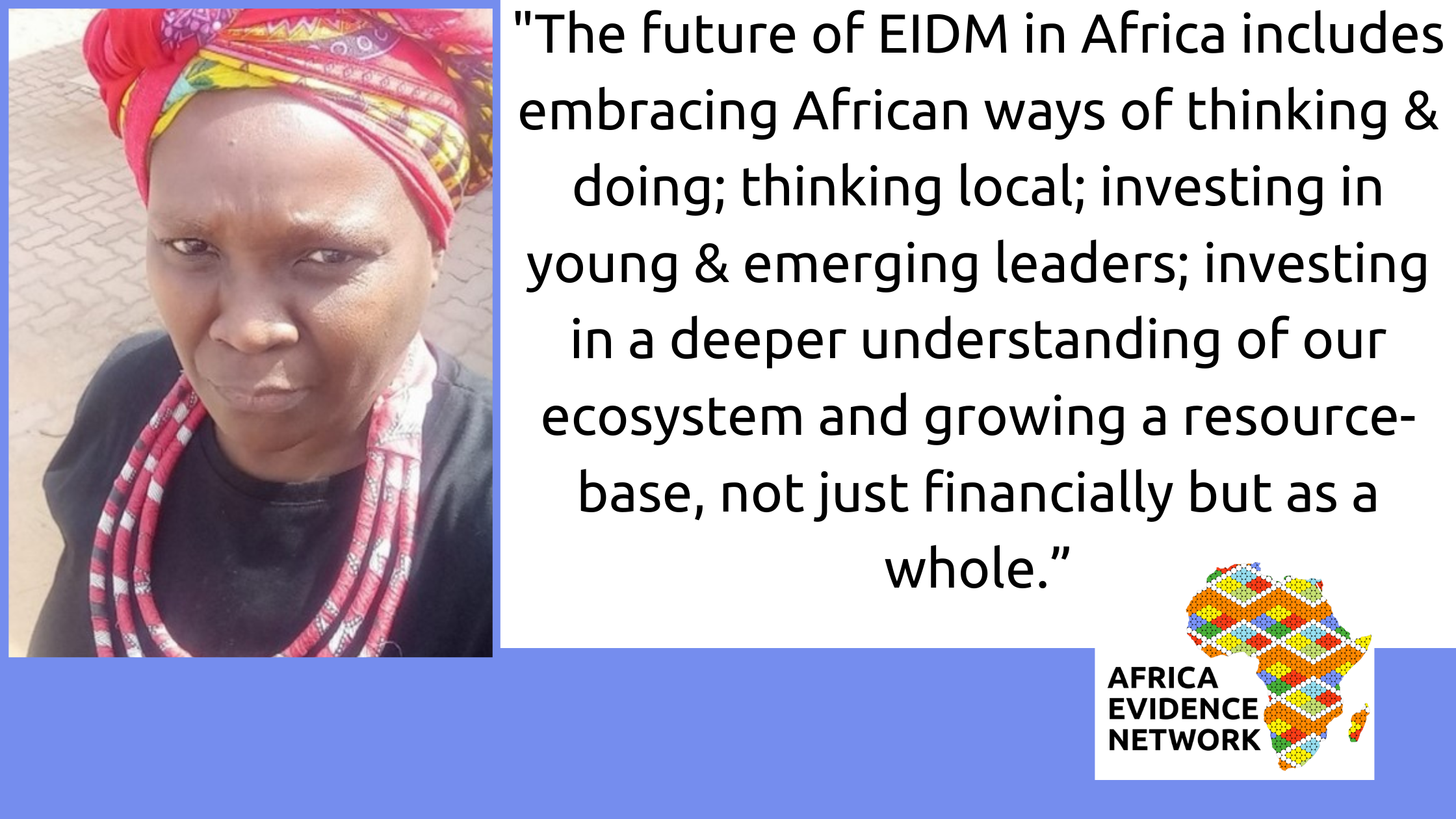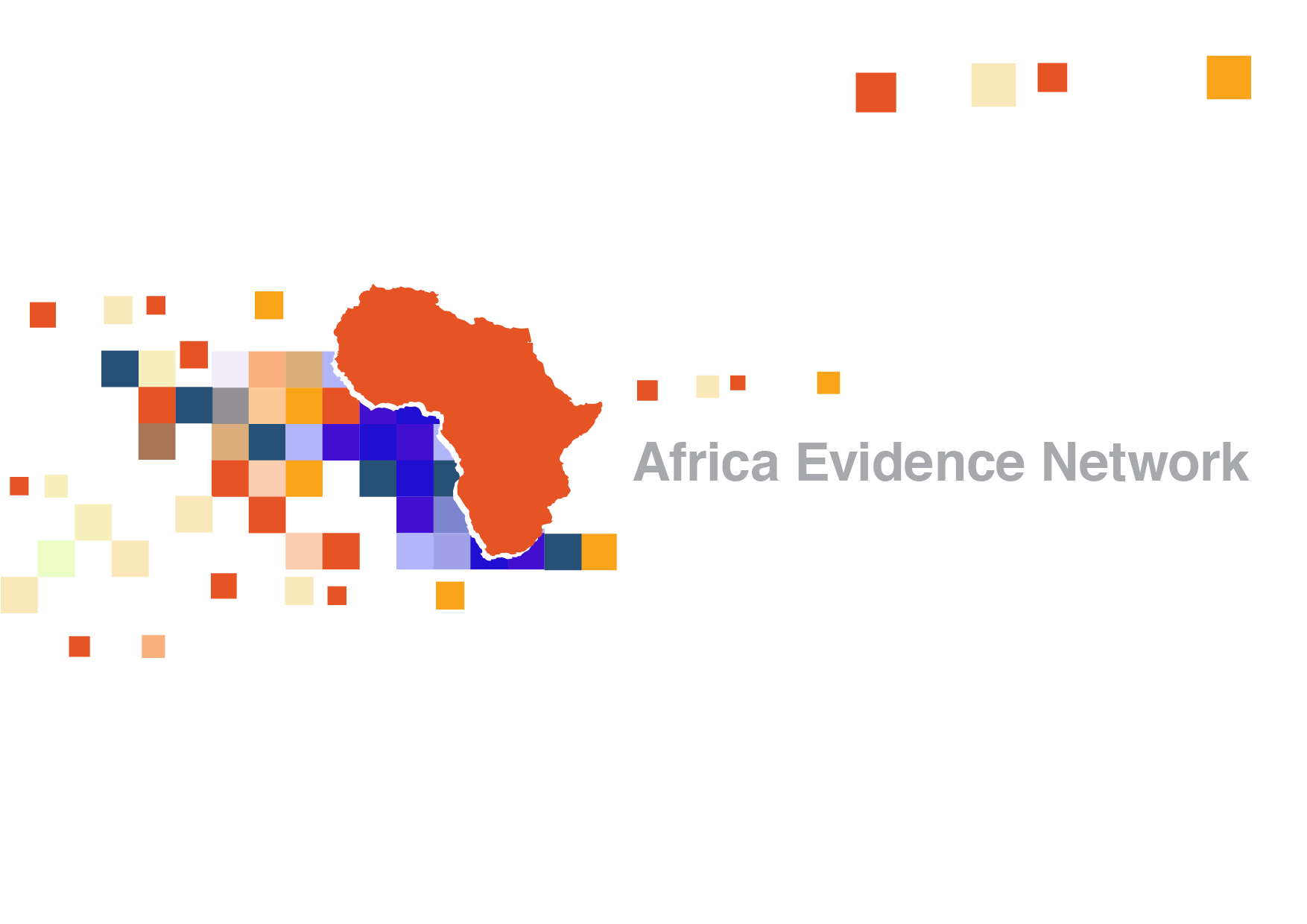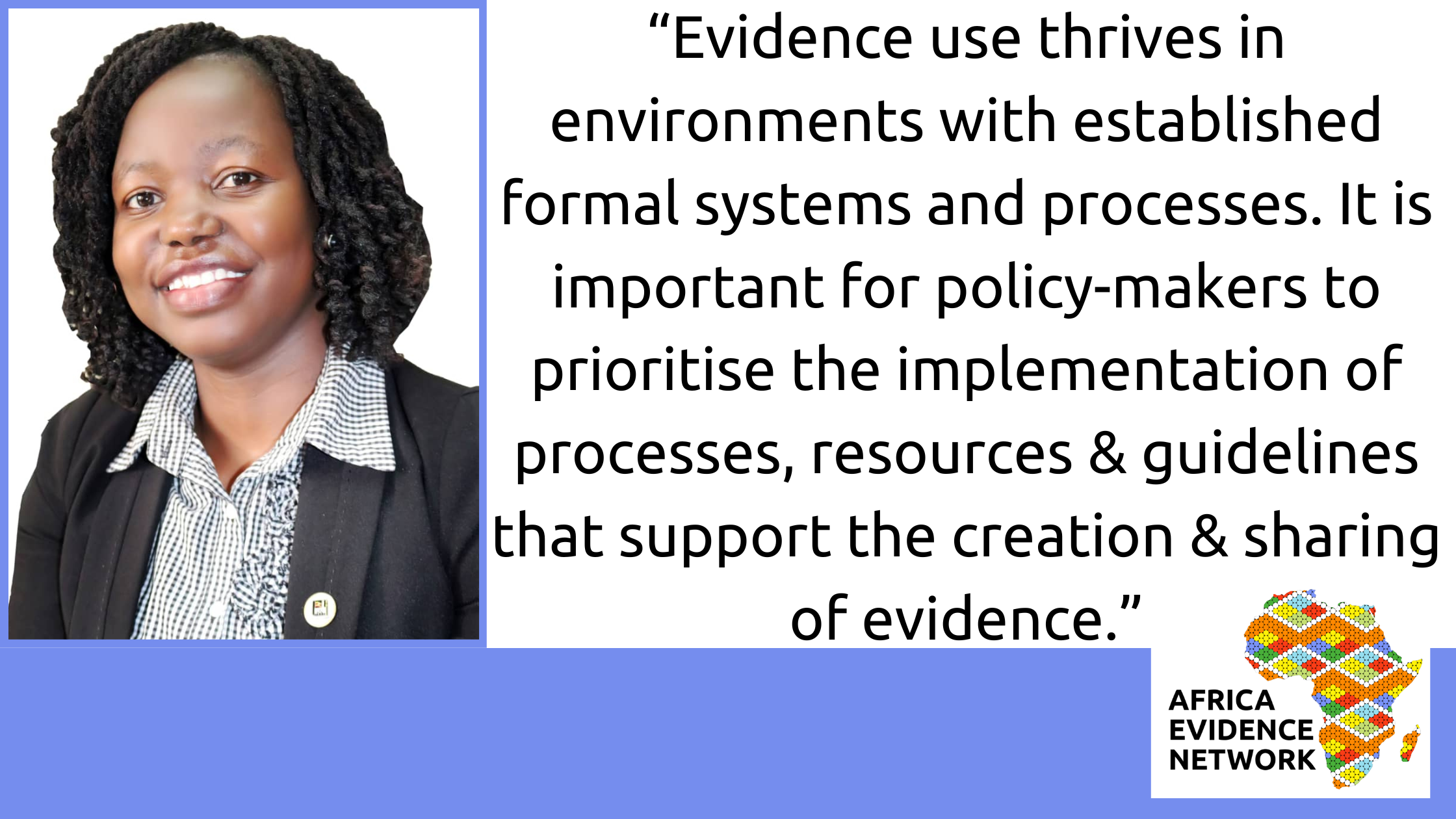
Welcome to the “Voices of evidence users” interview series, offering first-hand insights from the people who use evidence in decision-making.
In this conversation, On Think Tanks (OTT) talks to Josephine Watera, Assistant Director of the Department of Research Services (DRS) for the Parliament of Uganda. Prior to this, she was head of the Monitoring and Evaluation Division in the Ugandan parliament. Josephine also received the Africa Evidence Leadership Award 2023 in the Evidence User category.
1. Tell us about your role
I hold the position of Assistant Director, Research Services, and previously served as the head of the Monitoring and Evaluation Division in the Parliament of Uganda. I also serve on the Independent Evaluation Panel for the Global Fund.
My current role involves leading a team of researchers who are dedicated to generating, synthesising, and facilitating the use of evidence for committees and individual members of parliament.
The DRS disseminates research evidence through field-based studies, policy and bill analyses, committee briefs, government programme evaluations, and post-legislative scrutiny to ascertain how specific laws impact citizens.
I determine research priorities by considering the demands of legislators and identified needs. I undertake the quality assurance of the research products and follow-up the use of evidence.
The Constitution of Uganda, in Article 79, grants parliament the power to legislate on all matters pertaining to peace, order, development and good governance.
The key functions of parliament are to enact legislation, oversee the executive, allocate the national budget and represent the voice of citizens. In all these roles, access and the use of evidence is central.
2. Can you give an example of a key recent policy debate in your sector that you were involved in? What role did evidence play in that debate, and where did the evidence come from?
As a member of the National Monitoring and Evaluation Technical Working Group, I was involved in commissioning a study on 20 public sector organisations (PSOs) in Uganda in 2017, led by the Office of the Prime Minister.
The main objective of the study was to understand their effectiveness and efficiency, but also to set clear performance indicators for their contribution to the overall national results framework.
One of the findings was the duplication and non-alignment of mandates in the key selected public sector organisations, leading to waste and inefficiencies in service production.
A recommendation was made to phase out, merge and restructure some PSOs, whose relevance was no longer justified or those with duplicated roles and responsibilities.
As a result, the cabinet resolved to undertake a comprehensive rationalisation of government agencies, aimed at improving efficiency in service delivery, the clarity of roles and reducing the cost of public administration.
The government introduced to parliament bills to reflect the recommendations of the study.
3. What are the main challenges and opportunities you see for embedding evidence systematically into the policy-making process?
The 2030 global agenda established an environment of inclusivity, accountability and partnerships. These aspirations create an opportunity for setting up systems for evidence use in the policy-making process.
Ordinary citizens are increasingly seen as key stakeholders in policy design, implementation and evaluation. In many countries, the access to information laws have facilitated entry into places and spaces that were traditionally closed to researchers.
Secondly, technology and innovation provides great opportunities for synthesising evidence in a timely and focused manner, but also provides avenues for making the evidence more accessible and usable.
Important to note, however, are the limitations in accessing quality data: less understanding of policy-making processes, limited resources and infrastructure, inadequate skills in evidence generation by researchers and use by stakeholders focusing evidence to meet their needs and closing the gap between evidence generation and evidence use. There is a risk for litigation with the emergence of privacy and data protection laws in most countries.
4. Are there any current or recent crises or transitions that you feel have changed the discussion around how research and evidence feeds into policy in Uganda?
Uganda launched the National Development Plan in 2010, which, among others, established an evaluation ecosystem focused on evidence-based decision-making. The plan led to the development of the National Monitoring and Evaluation Strategy and the enactment of the National Evaluation Policy, 2013.
Under the strategy, annual performance reviews are mandatory for all sectors and programmes, while the policy provides guidance on resourcing, commissioning, implementing, and utilising evaluation results to shape national policy.
The recently adopted programme-based budgeting has driven the need and use of research and evidence.
Moreover, the rise in public demand for accountability has shaped the integration of research and evidence in policy decisions in Uganda.
In 2019, the country introduced the community monitoring advocacy initiative, commonly known as ‘barazas’.
The initiative is meant to increase the transparency with which the public sector carries out plans to ensure that these are in-line with the local and national needs/priorities (informed by evidence), and that these are being implemented as planned and within budget across sectors.
5. What advice do you have for researchers hoping to see their work inform policy?
It is important for researchers to enhance their data generation and communication skills to facilitate the production of timely and credible evidence.
Since policy-makers may not always have the necessary knowledge and expertise, researchers should take on the responsibility of capacity-building in the dissemination of evidence.
Building relationships with policy-makers is crucial for researchers to have influence on policy agendas, both formally and informally.
To ensure evidence-based policy-making, research institutions should have the necessary budgets and structures in place for the production and implementation of evidence.
Building on peer-to-peer collaborations and learning is crucial for researchers to share experiences and to impact the application of research. An African peer-to-peer initiative of parliamentary researchers resulted in the development of a parliamentary oversight tool for generating evidence.
6. What advice do you have for policy-makers wanting to improve their use of evidence?
Policy-makers should promote a culture of using evidence by actively seeking and referencing research in policy debates.
Evidence use thrives in environments with established formal systems and processes. It is important for policy-makers to prioritise the implementation of processes, resources and guidelines that support the creation and sharing of evidence.
Policy-makers ought to establish collaborations with researchers and offer prompt feedback on the evidence, particularly its applicability in addressing the policy concern at hand.
Policy-makers are responsible for safeguarding evidence producers through speaking out against victimisation and enacting protective legislation for witnesses and whistleblowers.
Policy-makers should serve as champions for evidence use by actively discussing its value in their work.
About the author: Ms Josephine Watera is a seasoned evaluator with sixteen years working experience in the evidence-informed decision-making space. She is an Assistant Director, Research Services and previous Head of the Monitoring and Evaluation Division in the Parliament of Uganda. Josephine leads her team to generate and synthesize evidence for committees and individual members of parliament to inform budgeting, legislation and oversight decisions. Josephine played a central role in developing monitoring and evaluation framework.
Josephine has been instrumental in developing tools and frameworks. She is currently supporting the development of guidance for responsible evaluation for the Independent Evaluation Group (IEG) of the World Bank Group (WBG). She is presently a member of the Ethics Guidance Working Group of the Canadian Evaluation Society. In 2021, she led two key processes: development of the African Evaluation Principles, 2021 by the Africa Evaluation Association (AfrEA) and development of guidelines for establishment of Monitoring and Evaluation Systems in African Parliament by Twende Mbele. Josephine was a member of the reference group for Development of Inter-Parliamentary Union indicators for democratic parliaments based on SDG 16.
She is a member of the Independent Evaluation Panel of the Global Fund, past Board Member of the International Development Evaluation Association (IDEAS), and the Vice President-Uganda Evaluation Association (UEA). Josephine is a member of the National Monitoring and Evaluation Technical Working Group. This working group undertakes identification of government evaluation topics, peer review and quality assurance of government evaluations and facilitates use of the evaluation findings in the public sector.
Josephine is a PhD candidate in Programme Evaluation at the University of Cape Town. A triple masters’ degree holder: Monitoring and Evaluation; Business Administration; and Social Sector Planning and Management.
She has conducted several capacity building programs in the field of monitoring and evaluations. In 2021, she developed a monitoring and evaluation module for the Commonwealth Parliamentary Association Academy. She facilitated the Development Evaluation Training in Africa (DETA), 2021. In 2018, she delivered training on “Evidence for Policy Making and Implementation course” organised by the Nelson Mandela School of Public Governance, University of Cape Town, South Africa. She conducted capacity needs assessment and training in performance management systems and designed evaluation tools for Malawi Parliamentary Committees.
Josephine was a mentor in Pilot EvalYouth International Mentoring Program aimed to build evaluation capacity of Young and Emerging Evaluators. She was also awarded, the most promising evaluator from developing countries by the American Evaluation Association, 2017.
About the author: On Think Tanks (OTT) is a global consultancy and platform for change. They support and strengthen the work of research organisations, foundations, governments and others in support of better-informed decision making.
Their consultancy work focuses on developing tailored solutions to specific challenges. Through services spanning research, strategy, evaluation, learning facilitation, and organisational transformation, OTT partners with organisations to drive evidence-informed change.
OTT is a leading global source of information, support and community for people working in, with and funding think tanks. They create a space to connect, learn and exchange knowledge, ideas and resources.
Acknowledgements: The author(s) are solely responsible for the content of this article, including all errors or omissions; acknowledgements do not imply endorsement of the content.
Disclaimer: The views expressed in published blog posts, as well as any errors or omissions, are the sole responsibility of the author/s and do not represent the views of the Africa Evidence Network, its secretariat, advisory or reference groups, or its funders; nor does it imply endorsement by the afore-mentioned parties.
